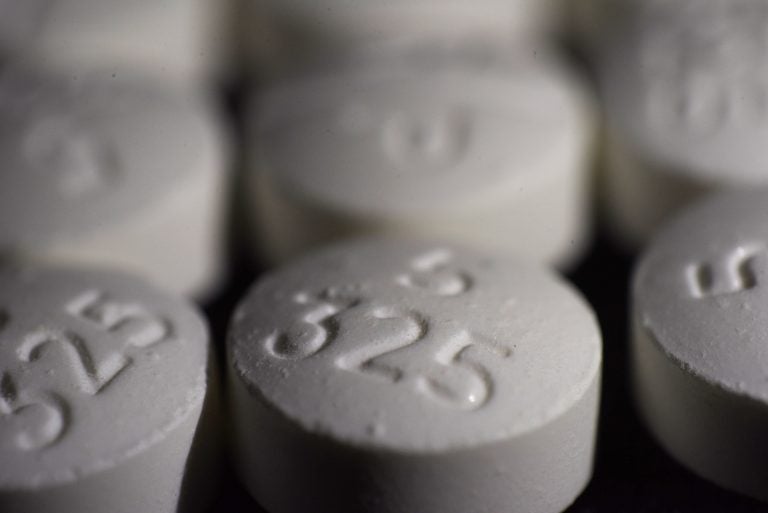Delaware officials say opioid prescriptions declining
The Division of Professional Regulations say new regulations are preventing over prescribing.

This photo shows an arrangement of pills of the opioid oxycodone-acetaminophen in New York. (Patrick Sison/AP Photo)
State officials in Delaware say new regulations aimed at preventing the overprescribing of opioids are making a difference just months after being put in place.
The Division of Professional Regulation is reporting a 12-percent drop in opioid prescriptions statewide compared to the first quarter of the year.
The number of patients treated with opioid medications also has declined by 8 percent, the division said.
“I think all of the activities we’re involved in, along with public health and law enforcement, are all aimed at reducing overdose deaths,” said division director David Mangler.
“The regulations and prescription monitoring program are aimed at what I would term primary prevention. This is aimed at ensuring when someone is prescribing they’re doing so appropriately and that other alternatives that could be equally effective are considered first and we’re proving the risks and benefit information to the patient.”
The regulations, which were enacted in April, limit opioid prescriptions to seven days—unless a prescriber can prove it’s necessary following a physical exam, and after checking the patient’s history in the state’s prescription database.
Doctor John Goodill said requiring physicians to check the database prevents what health officials call “doctor shopping.”
The palliative care physician and pulmonary specialist, who’s also a member of the state’s Addiction Action Committee, said the key is striking a balance between ensuring opioids are available to those in need without overprescribing.
“It goes back 15 or 20 years. The pharmaceutical industry has been felt to be at a fair amount of fault by over advertising and marketing their drugs like OxyContin for more than what they should have been doing. They basically convinced physicians to use those medications in amounts and places where they shouldn’t have. It has taken us a while to see the damage that has done and we’re now trying to recalibrate how we use these medications in a much more safe and effective manner,” Goodill said.
“I don’t think they’re bad doctors, I think they’re doctors trying to do the right thing. We were told in the mid-90s and up to 2000 that we needed to relieve pain. It was a joint commission requirement that pain be a fifth vital sign and we aim at the goal of relieving everyone’s pain. The reality is we rarely relieve all pain and the goal now is a more realistic one of trying to manage pain so a person can live with it and we have learned by a decade of overprescribing there’s a lot of bad things that come with that.”
He said alternatives include stress reduction, physical therapy, acupuncture and yoga.
The prescription monitoring program has been in place since 2012, but the state said the database is now easier to use. An advisory committee also is evaluating prescriber’s practices to ensure they’re following laws and licensing standards.
The new regulations coincide with several statewide efforts to combat the opioid epidemic.
Last year there were 308 overdose deaths in Delaware—that’s up from 228 in 2015 and 224 in 2014. In 2015, Delaware’s drug overdose rate was the 12th highest in the country. So far this year, there have been 192 suspected overdose deaths.
The state established the Behavioral Health Consortium to develop an action plan that will prevent and treat substance use disorder, expand treatment and recovery and provide support for the family members of those battling addiction or coping with mental health issues.
The state’s Addiction Action Committee is considering possible legislation requiring health insurance coverage of alternatives to opioids for pain management, as well as responses to the co-prescription of opioids and benzodiazepines.
Goodill said prescription opiates are only tangentially related to overdose deaths, however, and that most overdose victims received their drugs from the illicit market.
“Some of those people get to those drugs through prescription opiates and we certainly want to make treatment available for those people and limit their exposure to prescription opiates, not to get them to that point in the first place, but a big part of the other side of the coin is illicit opiates and their availability and getting people using heroin and fentanyl on the street to appropriate treatment for their addiction is an important aspect to fixing this problem,” he said.
The Department of Health and Social Services also has boosted resources to help individuals struggling with addiction. Educational materials about identifying and fighting addiction can be found at HelpIsHereDE.com. Individuals who are suffering from addiction can also call DHSS’ 24/7 Crisis Hotline to be connected to treatment options. In New Castle County, call 800-652-2929, or Kent and Sussex Counties, call 800-345-6785.
WHYY is your source for fact-based, in-depth journalism and information. As a nonprofit organization, we rely on financial support from readers like you. Please give today.





